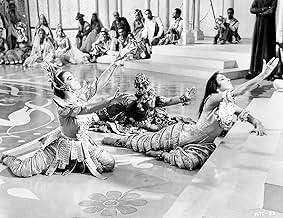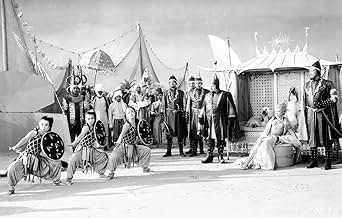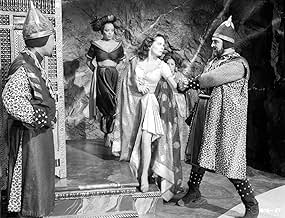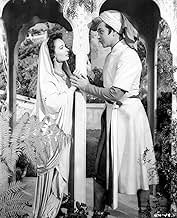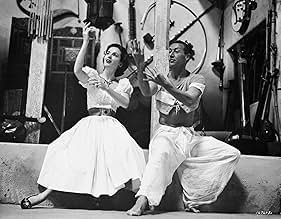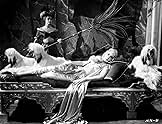IMDb RATING
6.3/10
1.8K
YOUR RATING
A roguish poet is given the run of the scheming Wazir's harem while pretending to help him usurp the young caliph.A roguish poet is given the run of the scheming Wazir's harem while pretending to help him usurp the young caliph.A roguish poet is given the run of the scheming Wazir's harem while pretending to help him usurp the young caliph.
- Directors
- Writers
- Stars
Ray Aghayan
- Brave Shopkeeper
- (uncredited)
Ed Agresti
- Nobleman
- (uncredited)
Richard Alameda
- Nobleman
- (uncredited)
Suzanne Ames
- Harem Showgirl
- (uncredited)
Jan Arvan
- Manservant
- (uncredited)
William Bagdad
- Wholesaler
- (uncredited)
Ross Bagdasarian
- Fevvol
- (uncredited)
Rama Bai
- Plump Ayah
- (uncredited)
- Directors
- Writers
- All cast & crew
- Production, box office & more at IMDbPro
6.31.8K
1
2
3
4
5
6
7
8
9
10
Featured reviews
A lavish, beautiful bore worth enduring for three ravishing songs!
I saw the original Broadway production of "Kismet" when I was 8 years old and, despite that fact that it was a smash-hit, found it excruciating to sit through with the exception of three ravishing ballads that became instant classics. The inevitable MGM film version came out three years later and was more of the same. Don't blame Vincente Minnelli for not wanting to direct it. The Arabian Nights plotline is unplayable and unwatchable (try the Colman-Dietrich 1944 version WITHOUT music--pure torture though a Technicolored eyeful). All that said, the 1955 version is still a must for movie-musical-lovers for the splendidly sung and staged renditions of "Baubles, Bangles and Beads" (Ann Blyth's finest four minutes--she is visually and vocally dazzling), Ms. Blyth and Vic Damone gorgeously dueting on "Stranger in Paradise", and the haunting "And This is My Beloved" (unfortunately given short shrift but still a vocal knockout thanks to Ms. Blyth (again!), Howard Keel and Vic Damone. A pity the rest of the film couldn't match these three outstanding highlights! Fate has never smiled upon any of the stage or film versions of "Kismet"!
Another great romantic musical of the 1950's
I first saw this movie when I was 10 years old with my parents. I fell in love with Ann Blyth and wanted to grow up and marry her someday. Seeing her in the Student Prince also helped. This was a great musical of the time. Younger people, when seeing this movie today (1999) must take into consideration that we had different morality then. Men,as well as women,liked movies for the romance . We were not looking for cheap sex scenes or showing a lot of skin. Ahhh.., the butterflies in the stomach and heart palpitations of being in love. Jane Powell was another heart throb of the time. See her movies also. I only wished I could have gown up and looked like and sang like Howard Keel.
Soft Simmering Breeze...Petals in the pool drifting....
KISMET was originally a play by Edward Knobloch written about 1910, and used as a vehicle for many years by the popular Broadway character actor Otis Skinner, playing the role of Hajj, the philosophical thief who saves the Caliph of Baghdad. Skinner even did a silent film version of the play. Two years after his death in 1942 a sound version of the film (in color) was made starring Ronald Colman, Marlene Dietrich, and Edward Arnold. The movie was a success, but nobody realized it would shortly become extremely successful in a new way. A song writing team (Bob Wright and Chet Forrest) constructed a score for KISMET based on the melodies of Alexander Borodin. The score contained such songs that became standards as STRANGER IN PARADISE (from the "Polevetsian Dances" in the opera PRINCE IGOR), BAUBLES, BANGLES, and BEADS, THIS IS MY BELOVED, THIS WAS THE NIGHT OF MY LIFE, and others. Wright and Forrest would do this several times on Broadway (they composed reset themes by Heitor Villa Lobos in another musical, for example) but KISMET was their joint masterpiece. So successful were they at rejuvenating the old Knobloch play, it was eventually revived again in the late 1990s in a new form as TIMBUCTOO (reset from the Califate of Baghdad to the great African trade city).
Eventually the musical came to the attention to the Freed unit at MGM, and Vincent Minelli was chosen to direct this 1955 version. The musical expanded on the play a little. Howard Keel (as Hajj - the name was restored to the original one, not Hafiz as Ronald Colman was named in the 1944 version) is involved at the beginning with Jay C. Flippen as a violent bandit leader who is seeking his son, and whom Hajj suggests will be found in Baghdad. We see Flippen from time to time looking for his missing son. In the end he does find the son (who lives up or down to Flippen's own reputation).
Keel had the right voice for Hajj, as did Dolores Gray as Lalume, the Vizier's bored wife (Dietrich in the 1944 film). Ann Blyth played Hajj's daughter Marsinah (who falls for the Caliph, Vic Damone). The evil vizier was played by Sebastian Cabot, and his rival government figure Omar (played by Harry Davenport in the 1944 film) is now played by Monty Wooley, in his final major movie part.
Actually the musical is livelier than it's critical history suggests. The old creaky play may turn off many critics, but it had some color, and the Borodin-inspired melodies raised it. But like BRIGADOON, Minelli could not shoot the film on location as it would have been incredibly expensive. Possibly the studio sets may have effected how the film was received by the critics. But it is entertaining, and (because of the music) very memorable. If some numbers were cut most of the big numbers were saved. Besides, I'd rather hear Keel sing A FOOL SAT BENEATH AN OLIVE TREE than hear Cabot (a questionable singing talent) try WAS I VIZIR. I don't think Sebastian Cabot even tried to sing once on FAMILY AFFAIR...his was a distinguished speaking voice, not a singing one.
Eventually the musical came to the attention to the Freed unit at MGM, and Vincent Minelli was chosen to direct this 1955 version. The musical expanded on the play a little. Howard Keel (as Hajj - the name was restored to the original one, not Hafiz as Ronald Colman was named in the 1944 version) is involved at the beginning with Jay C. Flippen as a violent bandit leader who is seeking his son, and whom Hajj suggests will be found in Baghdad. We see Flippen from time to time looking for his missing son. In the end he does find the son (who lives up or down to Flippen's own reputation).
Keel had the right voice for Hajj, as did Dolores Gray as Lalume, the Vizier's bored wife (Dietrich in the 1944 film). Ann Blyth played Hajj's daughter Marsinah (who falls for the Caliph, Vic Damone). The evil vizier was played by Sebastian Cabot, and his rival government figure Omar (played by Harry Davenport in the 1944 film) is now played by Monty Wooley, in his final major movie part.
Actually the musical is livelier than it's critical history suggests. The old creaky play may turn off many critics, but it had some color, and the Borodin-inspired melodies raised it. But like BRIGADOON, Minelli could not shoot the film on location as it would have been incredibly expensive. Possibly the studio sets may have effected how the film was received by the critics. But it is entertaining, and (because of the music) very memorable. If some numbers were cut most of the big numbers were saved. Besides, I'd rather hear Keel sing A FOOL SAT BENEATH AN OLIVE TREE than hear Cabot (a questionable singing talent) try WAS I VIZIR. I don't think Sebastian Cabot even tried to sing once on FAMILY AFFAIR...his was a distinguished speaking voice, not a singing one.
Superb Color, Intriguing Plot; and the Most Beautiful Music of Any Musical
This is musically the most glorious Broadway show of them all. in my judgment; and the most opulent of all filmed musicals in its sound, lyrics and colorful presentation. Of course, it might have been made differently, or better, or smaller or larger. But I am personally glad, as its biggest fan, and as writer, singer, songwriter, critic and moviegoer, that the film was made as honestly as it was. To begin with, the cast is vocally (unarguably) very fine; the two songs omitted, "Was I Wazir" and "He's in Love" were stage songs, without movement and needed omitting. The direction by Vincente Minnelli is very solid and generally fine, the use of color unprecedented. And this film has Howard Keel's best movie role ever, Ann Blyth lovely and seemingly young as his daughter, Sebastian Cabot as the wicked Wazir, Jay C. Flippen as his bandit father, suggestively sexy Dolores Gray as Lalume, and Vic Damone as the lovestruck very-young Caliph. The film's story-line follows the revived stage-play which was adapted to musical purposes in the early 1950s, for Broadway. The main storyline involves an ingenious but penniless poet, a maker of rhymes, who has a daughter; she wants a better life, he wants a better life for her. He finds gold, which a famous bandit claims as his own; but the gold buys him instant wealth; his arrest because he cannot account for the wealth nearly gets him killed; but he sells the idea that he is a magician to the Wazir and fortune favors his predictions. Four other strands are also interwoven in the deft and very entertaining plot. His daughter has met and fallen in love in a garden with the young Caliph without recognizing him; the wicked Wazir of the empire is pressing the young ruler to marry one of the Wazir's choices for monetary advantage; the Wazir's sexy favorite wife falls in love with the poet; and the bandit chief is seeking his long-lost son, who turns out to be the wicked Wazir. All the strands meet when to save his daughter from being forcibly married to the Wazir (to keep her from the Caliph who is still searching for her), the poet tries to drown the Wazir who has had his bandit father murdered when he's found him,and the Caliph alone can set things to rights when he discovers what his true enemy has been plotting. The poet accepts banishment--with Lalume--at an oasis, the daughter marries the Caliph, and the story ends in a splendid wedding. Robert Wright adapted the songs from the music of Aleksandr Borodin. Charles leader and Luther Davis get the credit for the literate screenplay; The sterling cinematography was done by Joseph Ruttenberg, art direction by Cedric Gibbons and E. Preston Ames, with set decoration by F. Keogh Gleason and Edwin Willis. Tony Duquette created the elaborate costumes for this Arabian Nights romp with hairstylings by Sydney Guilaroff and makeup by William Tuttle. Some of the lovely songs from this show are among the brightest lyrics and most beautiful melodies in Broadway--and Hollywood--history. The showstoppers are "Stranger in Paradise", "This is My Beloved", "The Olive Tree", "The Song of the Hand", Not Since Nineveh", Baubles, Bangles and Beads", "Night of My Nights", "Sands of Time" and "Rahadlakum". Among the performers, Dolores Gray is incomparable in the part, and Howard Keel very good in every respect. Among the others involved, Jack Elam, Ted de Corsia, Monty Wolley, and Flippen contribute good work. With a bit more money to expend, outdoor locations could have expanded the film. But most viewers who discover this film fall under the spell of its opulent and beautifully-pacing opening and find the production, as do professionally and personally, very enjoyable indeed.
A waste of good singing but worth seeing once.
Kismet isn't a complete waste of time but director Minelli was itching to do Lust for Life and had little enthusiasm for this assignment, which engaged his abilities, but not his sympathies. Unfortunately, it shows. Like Brigadoon and a few other musicals, this was one case where the Freed factory failed despite some gorgeous singing by the principals (Vic Damone is no actor but he ravishes "Stranger in Paradise"). Some numbers are shorn from the score, which doesn't hurt much but some are added, which does. There's a stale, formulaic quality to this movie and Kismet is a hothouse flower that doesn't thrive under M-G-M's "crunch-it-out" treatment. More imagination and taste were needed. There are several good recordings of the score and I'd suggest that, if you like the music (what's not to like?), you experience Kismet aurally.
Did you know
- TriviaIt was Vernon Duke who suggested Bob Wright and Chet Forrest use the music of Aleksandr Borodin as a basis for their score.
- GoofsPrior to the start of "Not Since Nineveh", Dolores Gray takes the gold purse from the Wazir to throw coins. When she's finished, she tosses it back to Sebastian Cabot which the actor fumbles and drops at his feet. During the song, the bag disappears and reappears at times and ends up behind his feet. It finally disappears by the end of the dance.
- Quotes
Chief Policeman: [the Poet has just been sentenced by the Wazir, and the Chief Policeman enters to find him and Lalume, the Wazir's wife, kissing] What kind of a sentence did he get?
- ConnectionsFeatured in MGM Parade: Episode #1.12 (1955)
- SoundtracksOverture
(uncredited)
Music and Lyrics by Bob Wright and Chet Forrest
Based on Themes by Aleksandr Borodin Performed by the MGM Studio Orchestra Conducted by André Previn
- How long is Kismet?Powered by Alexa
Details
- Release date
- Country of origin
- Language
- Also known as
- Un extraño en el paraíso
- Filming locations
- Metro-Goldwyn-Mayer Studios - 10202 W. Washington Blvd., Culver City, California, USA(studio: made in Hollywood, U.S.A. by)
- Production company
- See more company credits at IMDbPro
Box office
- Budget
- $2,692,960 (estimated)
Contribute to this page
Suggest an edit or add missing content


